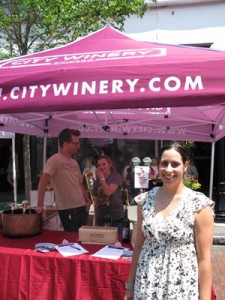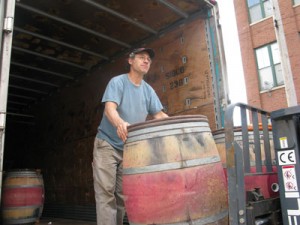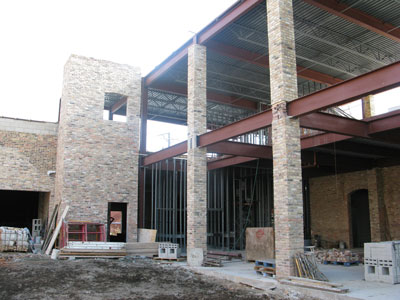City Winery Set to Be Downtown Chicago’s First Winery

Rachel Driver Speckan, Beverage Director, City Winery Chicago
The 28,000 square foot City Winery currently under construction in Chicago’s West Loop will feature 2013 vintage Midwest regional wines according to Beverage Director, Rachel Driver Speckan, formerly General Manager at Lush Wine and Spirits where she was a proponent of regional wine.
Driver Speckan said City Winery will explore Michigan and Illinois wines first. Preliminary conversations are currently underway with Hickory Creek in Michigan and Illinois Sparkling Company. “City Winery in Chicago will have a commitment to regional wines,” Driver Speckan said, pointing to the success of the City Winery in New York, which since 2008 has featured regional wines, mainly from the Finger Lakes region.
City Winery Chicago, which is scheduled to open in early August at 1200 West Randolph, is more than just a large wine bar with over 300 bottled wines, Driver Speckan explains. “We’re bringing wine country into the heart of Chicago. City Winery will be a real producing winery.”
She also explained that the customer experience at City Winery will be built around wine. “We’re combining the winery tasting room experience with a restaurant that compliments wines from all around the world and wines we will make right here in Chicago.”
Currently, the only producing winery in Chicago is Wild Blossom Meadery and Winery on the far South Side. (It’s likely that the last producing winery in or near downtown Chicago was affiliated with a speakeasy.)
Please see related story: Wild Blossom Expands on Chicago’s South Side
City Winery will have a restaurant and wine bar with seating for 150. There will also be a 25o seat concert space with 200 concerts per year. The build out and addition to a former cold storage facility is reported to cost around $9 million. City Winery Chicago is the brainchild of Michael Dorf, longtime amatuer winemaker and founder of City Winery New York. One of the lead investors in City Winery Chicago is former Groupon exec Ken Pelletier.

Robert Kowal, Winemaker, City Winery Chicago
The winemaker for City Winery is Robert Kowal. Kowal left a television production career in Hawaii in 1995 and moved to Oregon where he worked as an assistant winemaker at Bethel Heights Winery. While in Oregon, he also developed his own label.
Kowal said that most of the wine produced at City Winery will be served on-location via a custom system and kegs, hoses, and taps. Estimated production in the first year is around 10,000 gallons. Not having to bottle certain wines has a direct influence on Kowal’s winemaking approach at City Winery.
“We will makes wines that are clear and fresh with as little manipulation as possible,” he said. “Bottling can batter wine, so bottling should only be for wines that are going to be shipped or aged.” Kowal also said that because most his wines will be consumed on site in a controlled temperature environment, he also does not have to be as concerned with fining or filtering.
Initially, there will be five City Winery wines on tap, eventually increasing to 13, according to Driver Speckan. One of the wine taps will be a “guest tap” that will change throughout the year.
City Winery will have a full wine production facility with 40 tons of refrigerated grapes arriving at the winery this year, Kowal said. City Winery’s fruit will initially come from multiple vineyards located as far south as Santa Barbara, California and as far north as Yakima, Washington. Kowal added that he has already started the process of locating grapes grown in Michigan and Illinois for future wine production.
Kowal expects that City Winery’s crusher/destemmer will arrive by late June. Also currently being installed are jacketed, temperature controlled stainless steel fermentation tanks. The winery will use a basic plate filtration system.
City Winery wil begin with 120 to 140 oak barrels. Of these, 25-30 will be French Oak with perhaps a couple of American and Hungarian Oak barrels for experimentation. Kowal said that he will do both steel and barrell fermentation for Chardonnay. Chardonnay and possibly Rousanne will spend 6 – 8 months in barrels post-fermentation. Reds will be tank fermented and aged in oak 1-2 years. Roses will be tank fermented and kegged or bottled by the spring following the harvest.
Kowal suggests that City Winery Chicago may import wine vinified at City Winery New York. Some of the wine Kowal made in Oregon that is currently being barrel aged in New York may be served in Chicago in the fall of 2012 pending regulatory approvals. “It’s been quite a long winding road,” Kowal said. “I’m excited to be at City Winery in Chicago making wine in the heart of a great city.”

City Winery will be the first winery in downtown Chicago
[wp_geo_map]

